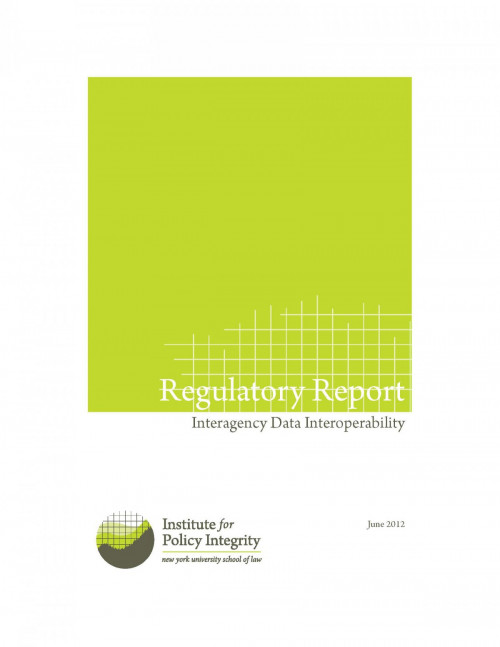-
Comments to FHFA on mortgage fees
Policy Integrity submitted comments to the Federal Housing Finance Agency (FHFA) on its proposal to increase the guarantee fees that Freddie Mac and Fannie Mae charge for single‐family mortgages in the states with the longest average time between default and a final foreclosure sale. This would mean that the costs charged to homeowners for mortgages will be higher in those states with the strongest judicial and regulatory protections against foreclosure.
-

Regulatory Report
Interagency Data Interoperability
This report shows what could be accomplished if straightforward changes were made to improve the way agencies interact. By sharing data, using the same metrics and coordinating on target populations, agencies could improve the impact of social services and stretch every tax dollar.
-
Comments to ACUS on its 56th Plenary Session
Policy Integrity submitted comments to ACUS (Administrative Conference of the United States) regarding various proposed recommendations to be considered at its 56th Plenary Session. As an independent federal agency that works to improve federal agency procedures, ACUS held its biannual assembly to discuss and vote on recommendations around issues such as regulatory analysis requirements, midnight rules, and coordination of multi-agency responsibilities.
-
Letter to OMB on Interagency Data Interoperability
Today, we sent a letter to the White House’s Office of Management and Budget suggesting ways that that federal agencies can use data to work more closely and maximize their efforts on behalf of the American public.
-
Comments to OIRA on their 2012 Annual Report
Today we submitted comments in response to OIRA’s annual report to Congress. Among the several specific suggestions is that the employment impacts of regulations be integrated into cost-benefit analysis in a balanced, transparent way. We recommend that OIRA should be careful to avoid any language that reinforces the mistaken belief that regulations inevitably lead to unemployment and that any analysis should do its best to model net employment impact, not just one region or sector.
-
Letter to OIRA on Interagency Coordination
Policy Integrity submitted a letter to OIRA Administrator Cass Sunstein today with recommendations for how OIRA can improve interagency coordination. The letter focuses on two key areas: (1) concerns about regulatory conflict, and (2) potential for harmonization of cost-benefit analysis methodology.
-
President Obama Signs New Executive Order
President Obama signed off today on a new Executive Order aimed at identifying and reducing regulatory burdens. It calls upon agencies to evaluate the effectives of old rules and issue reports on their progress.
-
Public Comments to the Administrative Conference of the United States
Today, Policy Integrity submitted public comments to the Administrative Conference of the United States regarding their Committee on Regulation’s proposed recommendations for review of regulatory analysis requirements.
-
Letter to U.S. Parole Commission on Responding to Parole Violators
The United States Parole Commission, the board responsible for granting parole and supervising parolees in its jurisdiction, is considering a proposal to improve its procedures for determining how to respond when released offenders violate the terms of their parole.
Viewing recent projects in Government Transparency
